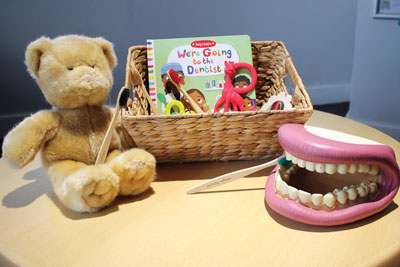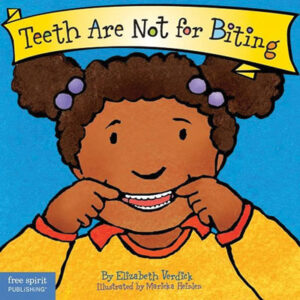
by Jovita Opio
Nursery Manager, Little Lancing Day Nursery & Forest School
Biting is a more common behaviour than one might think amongst very young children and it’s a topic that is not always spoken about very much, until it happens within your family. It can happen anywhere – in the home, at a soft play or play park, a child’s birthday party and of course in a childcare setting.
Biting can be a shock and it is certainly distressing – for the child or adult who has been bitten and the parents of a child who has been bitten who can understandably feel angry about it. It should go without saying that it is also upsetting for the parents of the child who has been biting.
Understanding about biting is vitally important to the way in which we respond to this happening – it is not the case that a child who bites is a ‘little monster’. He or she should not be punished for it, or worse still, bitten back. That’s not to say that this behaviour should simply be ignored. The following will help to explain why some children bite and what strategies can be employed to navigate a way through this behaviour.
Starting with the youngest of babies, as they begin to understand and engage with the world around them, they use all their senses as part of that natural exploration, and that includes using their mouths. Parents, carers and nursery staff all know that babies are inclined to put anything and everything into their mouths. It’s also a common feature of teething that babies will bite down on practically anything within reach to relieve the discomfort caused to their gums. It’s highly unlikely that children that young would deliberately bite another person with any kind of malice or ill feeling. In fact it’s sometimes the case that this is how they express their feelings of love – some babies only ever bite their parents!
As babies become toddlers, they continue to develop their language and communications skills and this happens at different times for different children. Some 18 month olds are real chatterboxes and others take more time to get to that stage. For those children whose language development occurs later, they may feel some frustration at not being able to express themselves and this can be a similar experience for children for whom English is an additional language.
Whenever children play together, there is inevitably a certain amount of disagreement that can creep in. For example, when both want to play with the same toy or when a child is blocking another child’s way, say on a slide or in a soft play environment. It’s a common reaction in such circumstances that a child may bite another child, or an adult, as they have not yet reached the point where they are able to express themselves verbally with the confidence to show their emotions.
Young children can find transitions and changes in their lives frustrating or stressful. For example, moving house, adjusting to changes in routine, the arrival of a new sibling as well as what might seem more mundane aspects of daily life, such as struggling to understand that they have to wait their turn to do something, or play with a particular toy, when they find it difficult to understand the concept of time. Biting can often be a response to relieving these frustrations and tensions.
It is also a possibility that some toddlers may find that biting focuses attention on them from adults and they see this as a reward. They are too young to differentiate between gaining attention through positive rather than negative behaviour. It’s also important to understand that children begin to realise that their behaviour (whatever it may be) can be a way for them to influence or control the environment or situation they find themselves in. Initially, biting can be a response to frustration or physical pain, but left unchecked, it may develop into a learned behaviour as a way of ending a situation they are not happy in or avoiding having to do something they do not want to do. It’s also the case that children at this stage of development may imitate all sorts of behaviours they see in others, and that includes biting.
Acquiring language and communication skills in turn leads into the stage in the early years development journey, where children begin to understand their emotions better and are more able to express themselves. This enables them to begin to self-regulate their responses to situations where they feel upset or angry.
So how best to deal with a situation when a child has bitten someone else?
For parents of the child who has been bitten, it’s understandable to feel anger and distress at what has happened. It’s all too easy to assume that the child who has been biting has additional needs (in most cases they don’t) and complaining to friends or other parents may not be helpful (and potentially embarrassing if your child then bites another person at another time). Discussing it with the parents of the child who has bitten may sometimes help understanding and clear the air but sadly this is not always a positive solution. If we are asking our children to be kind in their dealings with others, we should be kind too.
Parents of young children who bite often do not know where to turn or how to help their child through this stage. It can feel overwhelming but there is help at hand. They can turn to their Health Visitor for advice, and if attending an Early Years setting, the nursery staff will be supportive. Working with parents to devise strategies is key, as is consistency in approach to biting.
Whether at home with family or within an early years setting, there are a number of strategies that can help children through this stage in their development. These include:
• Praising and rewarding positive behaviour, so children don’t only get attention for negative behaviour.
• When a child bites another child, focus the attention first on comforting the child who has been bitten, so the child who has bitten does not receive priority attention. Remove them from the situation and make it clear with simple phrases such as “Stop. Biting hurts your friend. Biting isn’t kind.” The days of the ‘naughty step’ should be long past – in fact the word ‘naughty’ should not even come into the conversation.
• Providing sensory activities to create a similar experience to the biting behaviour and build these into a child’s daily routine – whether a ‘chew’ teething toy, such as a ‘chew buddy’, a ‘chew necklace’ or offering a healthy crunchy snack of fruit or vegetables.
• Redirecting a child’s attention to offer an alternative activity if they are struggling to regulate their response to a frustrating situation is a useful technique to defusing tension.
• Using visual prompts and storytelling to the children (at nursery this usually takes place as a group activity) helps them to learn. For example, if there has been an incident at a soft play, this can become the theme of a social story, using role play, such as puppets, to help children understand better positive strategies to use in social situations.
 • Reading storybooks, for example the behaviour series by Elizabeth Verdick and other authors, such as ‘Teeth are not for Biting’, is commonly used in Early Years settings to help reinforce positive messages about behaviour. These could also be used by parents at home. This is most beneficial if used proactively, rather than as a reaction to specific events.
• Reading storybooks, for example the behaviour series by Elizabeth Verdick and other authors, such as ‘Teeth are not for Biting’, is commonly used in Early Years settings to help reinforce positive messages about behaviour. These could also be used by parents at home. This is most beneficial if used proactively, rather than as a reaction to specific events.
• Modelling turn-taking activities and extending play to other popular toys and interests so the child is engaged in another activity while waiting for the toy they want. Having more than one of a particularly popular toy or activity available can help smooth out any potentially tricky situations. Using a sand timer as a visual aid to help children to understand when it’s their turn can also help teach them to learn to wait.
For repeated incidences of biting, nursery staff monitor the ‘Why, Where, When’ of occurrences, to see if there is a pattern for this. For instance, is it when they are tired or hungry, or is there an activity that regularly triggers the impulse to bite? It may in fact be a combination of factors and strategies can then be put in place to help avoid situations that can give rise to biting.
For the parents of a child who bites, it is important to know that they are not alone. Very many children, some say up to a quarter of all children, will bite at some point during their early lives. Most commonly this is amongst those aged two to three years. That doesn’t make it any less difficult for all concerned but it is helpful to know that it is a phase that usually will pass.
The Lancing College family includes its two Prep Schools located in Hove and Worthing and Little Lancing Day Nursery & Forest School which offers day care all-year round for children aged two months and over. www.littlelancing.co.uk, www.lancingcollege.co.uk











